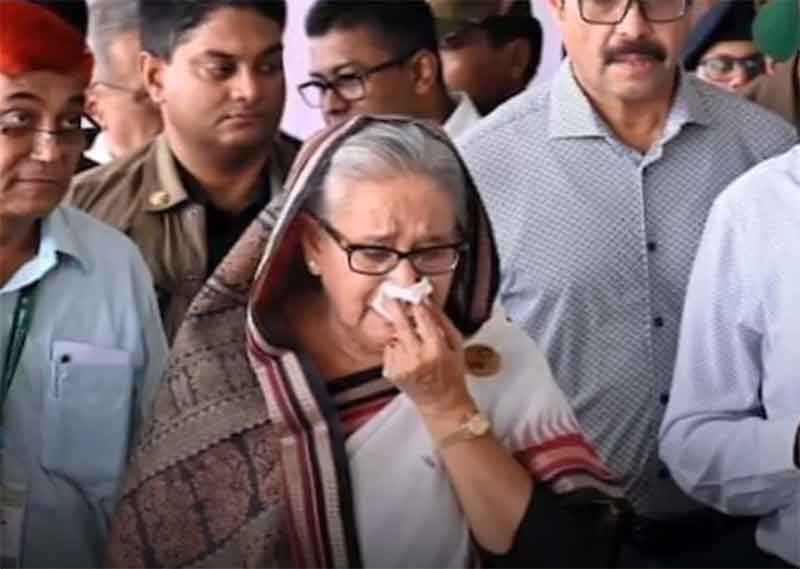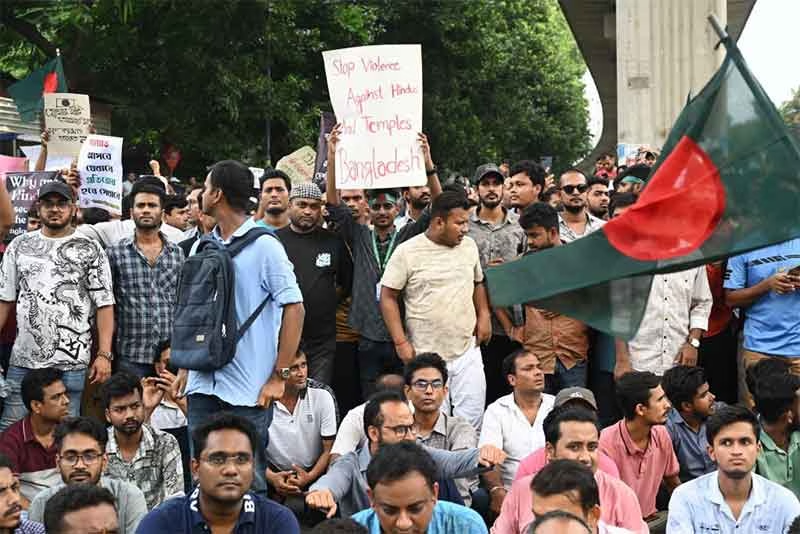
Salil Tripathi is the author of The Colonel Who Would Not Repent: The Bangladesh War and its Unquiet Legacy (Aleph 2014) about the liberation war and its aftermath. He is a journalist and writer based in New York.” In this Exclusive interview with ABHISH K. BOSE, Salil Tripathi, author and journalist, shares his insights on the Bangladesh crisis, highlighting the complex interplay of factors contributing to the country’s political instability, economic precariousness, and environmental degradation. He emphasizes the need for democratic renewal, innovative leadership, and international solidarity to address these challenges. Tripathi notes the resilience of Bangladeshi civil society and the importance of autonomy for NGOs. He also cautions against oversimplifying the crisis, acknowledging the intricate dynamics at play. Through his nuanced analysis, Tripathi offers a thoughtful perspective on the transformative potential of grassroots movements and democratic governance in Bangladesh.
Excerpts from the interview
1, Was Sheikh Hasina’s precipitous downfall from power a direct consequence of her regime’s entrenched anti-democratic tendencies, manifest in the creation of ‘King’s Parties’, repression of opposition, attempted fragmentation of rival parties, exploitation of state machinery for electoral coercion, and perpetuation of violence through proxy candidates? In other words, did her government’s systematic erosion of democratic norms and institutions ultimately precipitate its own demise, illustrating the paradoxical phenomenon of authoritarian overreach catalyzing regime collapse?
Many Bangladeshis had many reasons to dislike Hasina’s regime, including corruption, human rights abuses, nepotism, disappearances, and concerns over election unfairness. So her style of governance certainly played a part.
2, What are the intricate dynamics and feedback loops between political authoritarianism, economic mismanagement, and environmental degradation that have culminated in the Bangladesh crisis, and how do these interconnected factors compromise the country’s prospects for sustainable development, human well-being, and environmental resilience, particularly in the context of climate change and global economic volatility?
I don’t think things are ever linear, with neat explanations, and what causes an eruption is often an unusual occurrence. Students have a vast number of grievances, and the spark was the quota agitation.
3, As Mohammed Yunus, the visionary Nobel laureate, assumes the transitional leadership of Bangladesh, he inherits a nation beset by dual crises: political instability and economic precariousness. With external debts surging past $100 billion and foreign exchange reserves dwindling amidst internal turmoil, what innovative strategies and transformative leadership will be required to steer the country towards fiscal solvency, economic revitalization, and democratic renewal, while harnessing his pioneering experience in microfinance and social entrepreneurship to create a more equitable and resilient future for Bangladesh?”
I do hope that the current government will focus on the most immediate task, which is to restore electoral democracy, and not try to solve Bangladesh’s many problems. However well-intentioned, these men and women are not elected, and there’s no accountability. They have been tasked to restore order and hold elections, which I hope they will, in another six months, at the most. But I don’t know if that is how things will turn out.
4, What is the character and scope of the targeted persecution and violence against the Hindu minority in Bangladesh, comprising approximately 8% of the population, who have historically been stalwart supporters of the ostensibly secular Awami League, yet are facing escalating attacks, forced conversions, land grabs, and cultural erasure, amidst a toxic political climate fueled by Islamist extremism and majoritarian nationalism, and what are the implications for the country’s fragile democratic fabric, secular identity, and human rights commitments?
There have been several instances of regrettable attacks on Hindus, but there have been many instances where Muslims, students, others have protected them. Among those who died earlier during the stir, many were Muslim. There is a backlash against a range of groups, including those pro-Awami, Hindu, those opposed to BNP and Jamat, etc; it is wrong to see this as reprisals only against Hindus. That’s the narrative India is propagating, but it offers only part of the very complex reality.
5, How have the entangled legacies of British colonialism’s ‘divide and rule’ policies, the 1947 Partition’s violent displacements, and the 1971 Liberation War’s unfinished nation-building project contributed to the contemporary crisis in Bangladesh, marked by authoritarianism, sectarianism, and economic instability, and what insights can be gleaned from these historical dynamics?
Most Bangladeshis alive today weren’t alive in 1947, and many didn’t even live through 1971; very few remember that Bangladesh was once part of Pakistan. So trying to see history to understand the present is useful only upto a point. The only lesson I draw is that Bangladesh’s majority is Bengali and Muslim; to see it as either-or is the problem of the one who observes that, not of Bangladeshis.
6, According to Germanwatch’s 2021 Global Climate Risk Index, Bengladesh ranks seventh on the list of countries most vulnerable to climate devastation. In what ways have climate change and environmental degradation, manifesting as intensified cyclones, sea-level rise, salinization, and water scarcity, intersected with socio-political and economic vulnerabilities to exacerbate the crisis in Bangladesh, and what innovative strategies can be employed to foster climate resilience, environmental sustainability, and adaptive governance?
Yes, Bangladesh’s geography presents significant challenges, but it has little to do with the current political crisis. It does increase the vulnerability of those living on or near the coastline.
7, How have geopolitical rivalries, regional dynamics, and globalization’s neoliberal forces intersected to shape the crisis in Bangladesh, influencing its sovereignty, foreign policy, and political economy, and what are the implications for the country’s development trajectory, particularly in regards to the triangulation of India-China-US interests in the region?
Bangladesh does fine on socioeconomic indicators, and it will not be a ‘least developed country’ from 2026, which is a good thing; since much of Bangladesh’s development is due to civil society initiatives, and since the current government has many people from NGOs, I don’t see any major setbacks. It has a jobs crisis, and for that, it needs to restore business confidence.
Subscribe to Our Newsletter
Get the latest CounterCurrents updates delivered straight to your inbox.
8, What is the transformative potential of grassroots movements and civil society initiatives in Bangladesh, particularly those focused on human rights, environmental justice, and democratic governance, in addressing the multifaceted crisis, and what lessons can be distilled from their successes and challenges ? Can these grassroots efforts coalesce into a broader, more inclusive movement for transformative change in Bangladesh, and what international solidarity and support mechanisms can amplify their impact?”
Bangladesh always has an impressive civil society movement, comprising of thousands of NGOs. They will continue to do what they must; the government must allow them autonomy, and at least the current government is likely to do so.
A journalist with fifteen of years of experience Abhish K Bose was a staffer at The Times of India and The Deccan Chronicle – Asian Age. As a contributor, his interviews or articles have been published in Frontline magazine, The Wire, The Print, The Telegraph, The Federal, The News Minute, Outlook.com, Scroll, The Kochi Post, Countercurrents.org, The Telegraph, Madhyamam Weekly, Andolana, Hardnews.com, and the Asian Lite international published out of Manchester.
















































